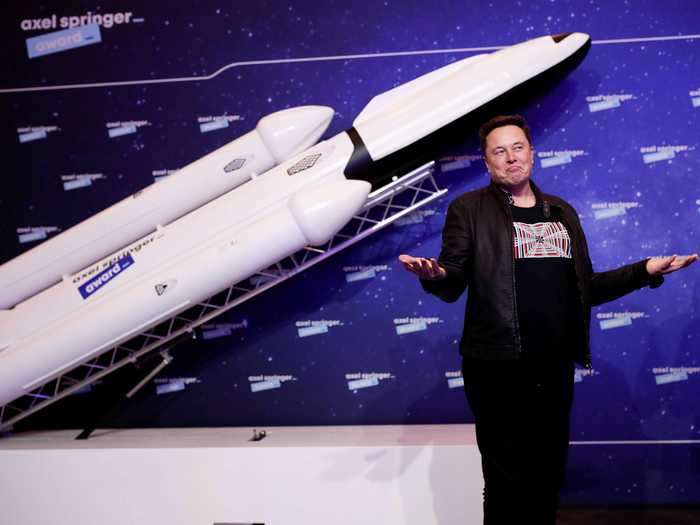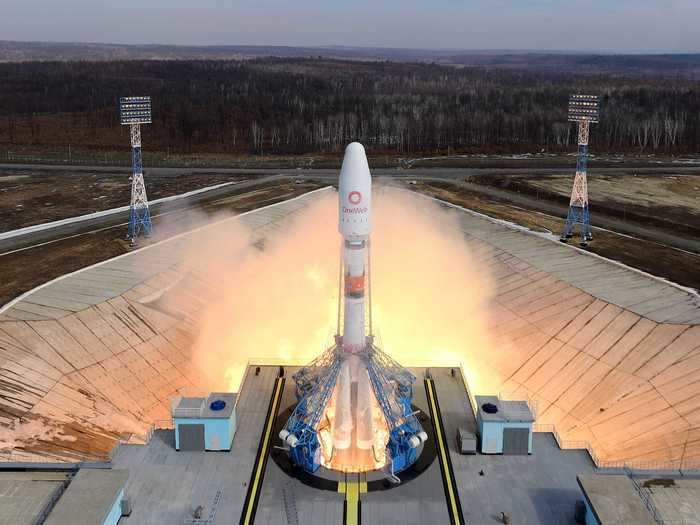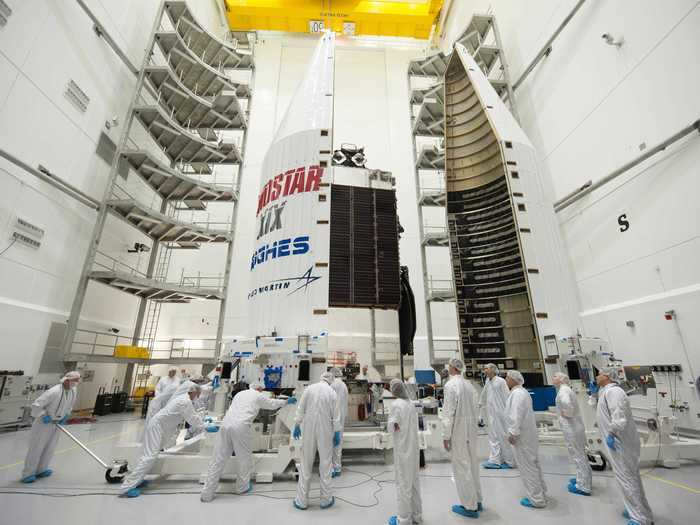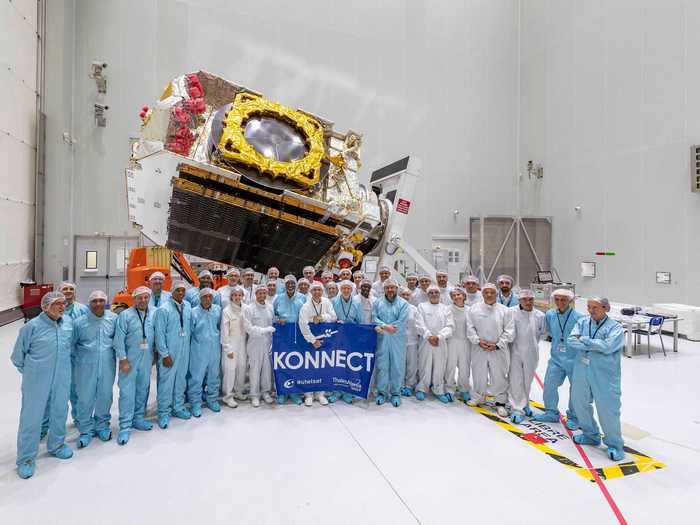Here are the 7 big space companies in the race to build a global satellite-internet network
Kate Duffy

- Satellite broadband is becoming an increasingly popular way to connect to the internet.
- Major space companies are offering super-fast internet, which beams down from satellites in orbit.
- They have one thing in common - they're racing to become the biggest name in satellite broadband.
SpaceX's Starlink

Out of all the companies, Starlink is the one that has launched the most satellites into orbit.
Elon Musk's space venture currently has more than 1,350 satellites in orbit, with plans to launch up to 42,000 by mid-2027. Eventually, Starlink — a subdivision of SpaceX — wants to wrap thousands of satellites around the Earth to build a global network.
Starlink's "Better Than Nothing Beta" test went live in October and has since gained over 10,000 users across six different countries.
Starlink's business model directly connects customers to the satellites — there are no telecommunications companies involved in between.
Users sign up to Starlink via its website. When the service is up and running in the area, subscribers receive an email to buy the kit. Starlink may even offer users $99 preorders, like it did in Australia, Mexico and parts of the US, where the network isn't live yet.
Once the order has been accepted, Starlink sends the kit, including a tripod, WiFi router and terminal to customers. Overall, this costs users $499 for the kit and $99 for the monthly Starlink subscription for up to 210 Megabits per second. Customers then set up the kit themselves.
Starlink is rapidly expanding — it plans on attaching antennas to moving vehicles to connect them to the satellite network.
Not everyone is fully on board with Starlink's dominance. Local internet service providers in the US say Starlink is using "unproven" technology with its satellite constellation. They have asked the Federal Communications Commission (FCC) to look into its application for the Rural Digital Opportunity Fund, for which Starlink was awarded $885 million.
Amazon's Project Kuiper

Project Kuiper, a subsidiary of Amazon, came to light in 2018 when government filings revealed the tech giant was going ahead with building a global space-based internet service.
The project aims to blast 3,236 satellites to 630 kilometers in orbit, very close to Starlink's satellites at 550 kilometres.
In January, the FCC gave Project Kuiper regulatory approval to launch its satellite fleet into space by July 2029 and connect with antennas on the Earth to provide internet service.
50% of its satellites should be operational by July 30, 2026.
It's not yet clear what Project Kuiper's satellites will look like or which rocket they will be launched on, but Amazon founder Jeff Bezos' space company Blue Origin could send them into orbit via its New Glenn rocket.
Sources told Insider in 2019 that Project Kuiper's headquarters are a few miles from Microsoft's headquarters in Redmond, Washington.
The UK's OneWeb

OneWeb is a British-owned satellite broadband provider that currently has 146 satellites at 1,200 km in orbit and plans to have 648 satellites in total to offer a global network.
The firm was rescued from bankruptcy by the UK government and India's Bharti Group in November and now pledges to invest $1 billion in the company.
OneWeb wants to provide internet to the whole of the UK by June. Its most recent launch on March 25 will deliver internet coverage to the top of the globe down to the 50th degree latitude, covering countries such as Alaska, Canada, Greenland, Russia, the Nordic countries, and northern Europe.
The UK firm offers a business-to-business model, whereby it provides satellite internet to telecommunications companies, which then distribute the service to customers.
Chris McLaughlin, chief of government, regulation and engagement at OneWeb told Insider the company has had discussions with the government about becoming part of the UK's $6.9 billion Project Gigabit — just like Starlink.
OneWeb and Starlink satellites almost collided into each other in orbit on April 3 that could have sent thousands of debris pieces flying around space, adding to the space junk crisis.
McLaughlin told Insider on Monday it was "no one's fault but a big challenge" to avoid this from happening.
Hughes Net

Hughes Net, the biggest satellite internet provider in the US, relies on satellites positioned 22,500 miles away in geostationary orbit to beam internet back down to Earth.
The main difference between the low-Earth orbit satellites and the bigger geostationary (GEO) satellites is that the latter are much further away in orbit and as a result can cause second-long delays in video calls and other technology.
But GEO satellites are in a fixed position, so unlike LEO satellites, they don't move around in orbit and target their internet service in one specific area.
Hughes, with more than 1.5 million subscribers, has six satellites in orbit, which cover various parts of North and South America and Canada, including Mexico, Brazil, and Chile.
Hughes Net spokesperson Sharyn Nerenberg told Insider the company is purely focused on providing internet to the Americas.
The last satellite Hughes launched was in June 2018 and it's aiming to send another one into orbit, named Jupiter 3, in the second half of 2022. Nerenberg said Jupiter 3 is going to be the largest commercial satellite ever launched.
Those who sign up for Hughes Net receive a kit through the post and get it installed by an outsourced company.
Costs for Hughes satellite service range from $59.99 to $149.99 per month for 25 Mbps download speeds. The kit is priced at $249.99 with a $199 installation charge, taking the total purchase price to $449.98 — $50 cheaper than SpaceX's Starlink.
Nerenberg also said Hughes offers community WiFi hotspots via its satellite network to small rural areas in Latin America for those who can't afford a subscription.
Canada's Telesat

Telesat, headed by Dan Goldberg, already has 15 GEO satellites more than 35,000 km (22,200 miles) above Earth.
The Canadian company is also planning a LEO constellation called "Lightspeed" — the first batch of 298 satellites, built by Thales Alenia Space, are expected to be launched by early 2023. The goal is to provide full global service by 2024.
Goldberg confirmed during the Satellite 2021 LEO Digital Forum on April 6, per Space News, that Lightspeed would cost $5 billion. This much cheaper than SpaceX's and Amazon's projects which exceed the $10 billion mark.
He told Reuters on Sunday that Telesat is "in the sweet spot" with pricing.
In 2019, Telesat signed a launch deal with Jeff Bezos' Blue Origin to use its rockets, such as the proposed New Glenn, to blast its LEO satellites into orbit.
David Wendling, Telesat's chief technical officer, told Reuters the company has three other launch deals in the pipeline.
ViaSat

Californian-based ViaSat operates five GEO satellites around 22,000 miles above the surface of the Earth.
It's adding to this constellation at the start of 2022 by putting three "ultra-high capacity GEO satellites" into orbit, which will give global coverage by 2023, a ViaSat spokesperson told Insider.
ViaSat is also planning on putting 288 satellites into low-Earth orbit (LEO) by 2026.
Mark Dankberg, ViaSat's executive chairman and co-founder, told Insider on Thursday that having both GEO and LEO satellites complement each other.
He said ViaSat are trying to create a "multiorbital constellation where you use GEO satellites and LEO satellites in a way that look seamless to users."
Dankberg gave an example of the benefits of using different orbital satellites for videos online: The LEO satellites can offer the latency — the delay between a user's actions and the internet's response — and the lower cost bandwidth from GEO satellites.
In December, Viasat asked the FCC to study the potential environmental impacts of Starlink. In response, Musk tweeted: "Starlink 'poses a hazard' to Viasat's profits, more like it."
Dankberg said it's common for companies to become "frenemies" in the space industry. Despite having a launch contract with SpaceX, ViaSat is concerned about the thousands of satellites SpaceX is putting into orbit.
Launching more satellites leads to a higher chance of collision, resulting in more space debris which could be a "doomsday scenario for space," according to Dankberg.
Eutelsat

Eutelsat is a European satellite operator that has 39 GEO satellites positioned at 46,000 kilometres away in orbit.
The company currently provides internet to parts of Europe, Africa, and parts of the Middle East and plans to launch another satellite called Konnect VHTS, which will cover the rest of Europe.
Michel Azibert, Eutelsat's deputy CEO, told Insider on Friday: "Konnect VHTS will be a game-changer, enabling Eutelsat to provide powerful connectivity seamlessly to the end user at a price comparable to those of terrestrial operators."
Prices for Eutelsat's satellite company range between €30 and €70 per month for speeds between 30 and 100 Mbps, with an upfront fee between €49 to €149 depending on the market, Azibert said.
He said the pricing was "well below Starlink's and very well adapted to the rural markets that we are targeting in EMEA."
Eutelsat's satellites "are a reliable solution to cost-effectively address areas and regions where fiber will remain too costly to deploy," he added.
Eutelsat, founded in 1977, sends its satellites into space from Vienna. The first satellite it launched was in 1983.
READ MORE ARTICLES ON
Popular Right Now
Popular Keywords
- India’s wearables market decline
- Vivo V40 Pro vs OnePlus 12R
- Nothing Phone (2a) Plus vs OnePlus Nord 4
- Upcoming smartphones launching in August
- Nothing Phone (2a) review
- Current Location in Google
- Hide Whatsapp Messages
- Phone is hacked or not
- Whatsapp Deleted Messages
- Download photos from Whatsapp
- Instagram Messages
- How to lock facebook profile
- Android 14
- Unfollowed on Instagram
Advertisement